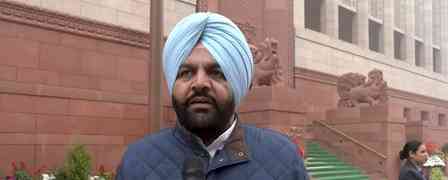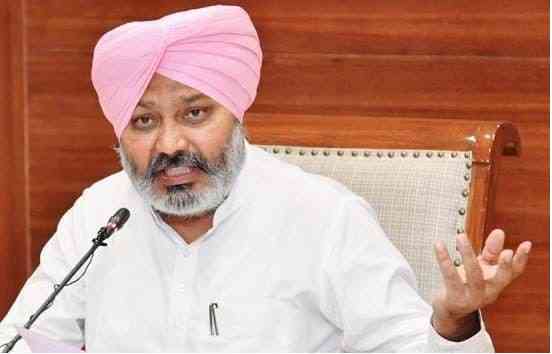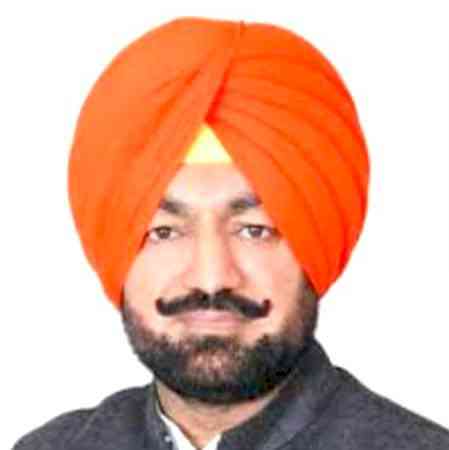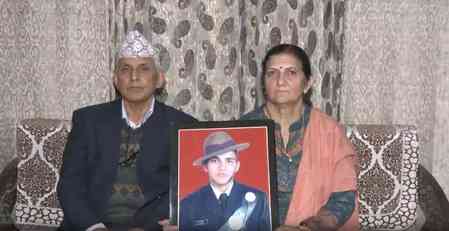Will 2022 be any different for AAP in Punjab's political landscape?
The meteoric rise of the Aam Aadmi Party (AAP) in the 2014 Parliamentary polls and then in the 2017 Assembly elections in Punjab followed by its nosedive owing to 'mass exodus' of its legislators is proving a litmus test for the party in the February 20 Assembly polls in the state.

Vishal Gulati
Chandigarh, Feb 13 (IANS) The meteoric rise of the Aam Aadmi Party (AAP) in the 2014 Parliamentary polls and then in the 2017 Assembly elections in Punjab followed by its nosedive owing to 'mass exodus' of its legislators is proving a litmus test for the party in the February 20 Assembly polls in the state.
Political observers say AAP was once seen as the alternative to the traditional parties that had dominated Punjab's electoral space for decades.
Learning a harsh lesson from its mistake during the 2017 Assembly polls of not declaring a chief ministerial candidate, this time AAP's CM face and two-time Lok Sabha member Bhagwant Mann is locked in a five-cornered contest with Congress' 'Aam Aadmi' Charanjit Singh Channi, Shiromani Akali Dal (SAD) chief Sukhbir Badal, Amarinder Singh, whose new party Punjab Lok Congress is in alliance with the BJP and the Samyukt Samaj Morcha, the fledging coalition of farm unions.
In 2017, AAP sought vote in the name of Arvind Kejriwal, and despite him being tagged an outsider, it managed to win 20 seats in the 117-member Punjab Assembly, emerging as the principal opposition party, pushing SAD to the number three position.
"Despite marking its grand foray in 2017 into the state politics that is largely dominated by the Congress and Akalis, the AAP leadership failed to understand the pulse of the common man who wanted to break the political duopoly," a former AAP leader told IANS, requesting anonymity.
The trouble in AAP began when its leaders and supporters started blaming the central leadership for running the party virtually from Delhi.
A vertical split in the party surfaced with Kejriwal's apology to Akali legislator Bikram Singh Majithia for settling a drug charge related defamation case.
Most of the party legislators, led by leader of opposition Sukhpal Singh Khaira, challenged his authority.
After that the party was plagued by desertion of legislators -- one after another -- or their suspensions in the last five years.
The result: AAP's nine sitting legislators left the party. They are -- Khaira from Bholath; Jagtar Singh Jagga Hissowal from Raikot; Peermal Singh Dhaula from Bhadaur; Master Baldev Singh from Jaitu; Rupinder Kaur Ruby from Bathinda; Jagdev Singh Kamalu from Maur; Nazar Singh Manshahia from Mansa; journalist-turned-politician Kanwar Sandhu from Kharar; and known lawyer H.S. Phoolka from Dakha.
Firebrand Khaira, who was elected from Bholath in 2017 on an AAP ticket, is in fray for a Congress ticket, while other rebels who are contesting as Congress candidates are Hissowal from Jagraon in Ludhiana district and Ruby from Malaut in Muktsar district.
Legislators Dhaula, who is campaigning for Channi in Bhadaur, Master Baldev Singh, Kamalu, Manshahia, Sandhu and Phoolka are not contesting the polls this time.
Interestingly in the coming polls, AAP nominees are facing opposition from their own dissidents.
The 10 legislators who are re-contesting are: Aman Arora from Sunam; Balwinder Kaur from Talwandi Sabo; Kultar Singh Sandhwan from Kotkapura; Leader of Opposition Harpal Singh Cheema from Dirba; Kulwant Singh Pandori from Mehal Kalan; Gurmeet Singh Meet Hayer from Barnala; Principal Budh Ram from Budhlada; Jai Kishan Rodi from Garshankar; Manjit Singh Bilaspur from Nihal Singh Wala; and Saravjit Kaur Manuke from Jagraon.
The 11th AAP legislator, Amarjit Singh Sandoa from Ropar, has been denied party nomination this time. The reason: He left AAP in 2017. Ahead of Lok Sabha polls in 2019, he joined Congress but later rejoined AAP.
Eyeing to catch 96 lakh women voters, who constitute 45 per cent of the state's total electorate of 2.12 crore, AAP has given tickets to 12 women candidates, the highest among all the political parties in the state. Also, a majority of its women candidates are well qualified.
About AAP's prospects to win Punjab, pollsters say that in the 2017 Assembly elections, it came second with an overall 24.4 per cent vote share against Congress' 38.5 per cent.
Two years after the Assembly polls, AAP faced a drubbing in the general elections in 2019, winning just one of the 13 Lok Sabha seats in the state. In its maiden foray in the 2014 Lok Sabha battle, it had won four seats in Punjab.
Barring Bhagwant Mann, who was elected from Sangrur in 2014 too, all the other candidates of the party forfeited their security deposits in 2019.
Its vote share in the state nosedived from 24.4 in 2017 to 7.4 per cent in 2019.
In February 2021, the poll results of the 117 municipal bodies, eight corporations and 109 councils and nagar panchayats in Punjab, held in the backdrop of agitation of farmers against the three farm laws, dashed AAP's resurgence hopes as the Congress swept the polls by winning a majority of the seats. SAD emerged second, while AAP's dismal show continued.
Unlike 2014, 2017 and 2019 polls, this time NRI Punjabis might give a noticeable miss to AAP. Earlier, many NRIs came out openly in its support by offering not only cash-rich wallets, but also pleading with the people to support AAP candidates.
In the 2017 Assembly elections, many NRIs had campaigned for AAP candidates.
Vancouver-based journalist Gurpreet Singh said that as in the past, the NRIs in Canada are curious about the upcoming Punjab elections though travel restrictions owing to the Covid-19 pandemic curtailed their physical presence.
He said many NRIs were once hoping AAP to create a history as it was being seen as a third alternative in the political landscape of Punjab.
"But AAP has now many challenges at hand. The foremost is the lack of consensus on the candidate for the chief minister's post. Not many here are impressed with Bhagwant Mann, as some find him non-serious and someone who lacks maturity and also credibility.
"They have been inclined to support H.S. Phoolka (former AAP legislator), who too turned out to be non-committal. They are also skeptical about the party's national convenor Arvind Kejriwal, who had sidelined Dharamvir Gandhi and has been peddling soft Hindutva and playing the nationalist card," Gurpreet Singh said.
Will the 2022 polls be any different for AAP? Will the party build on its 2017 tally of 20 seats? Pollsters believe only time will tell.
The 117-member Punjab Assembly will go to the polls on February 20, while the counting of votes will be taken up on March 10.
(Vishal Gulati can be reached at [email protected])


 IANS
IANS 










